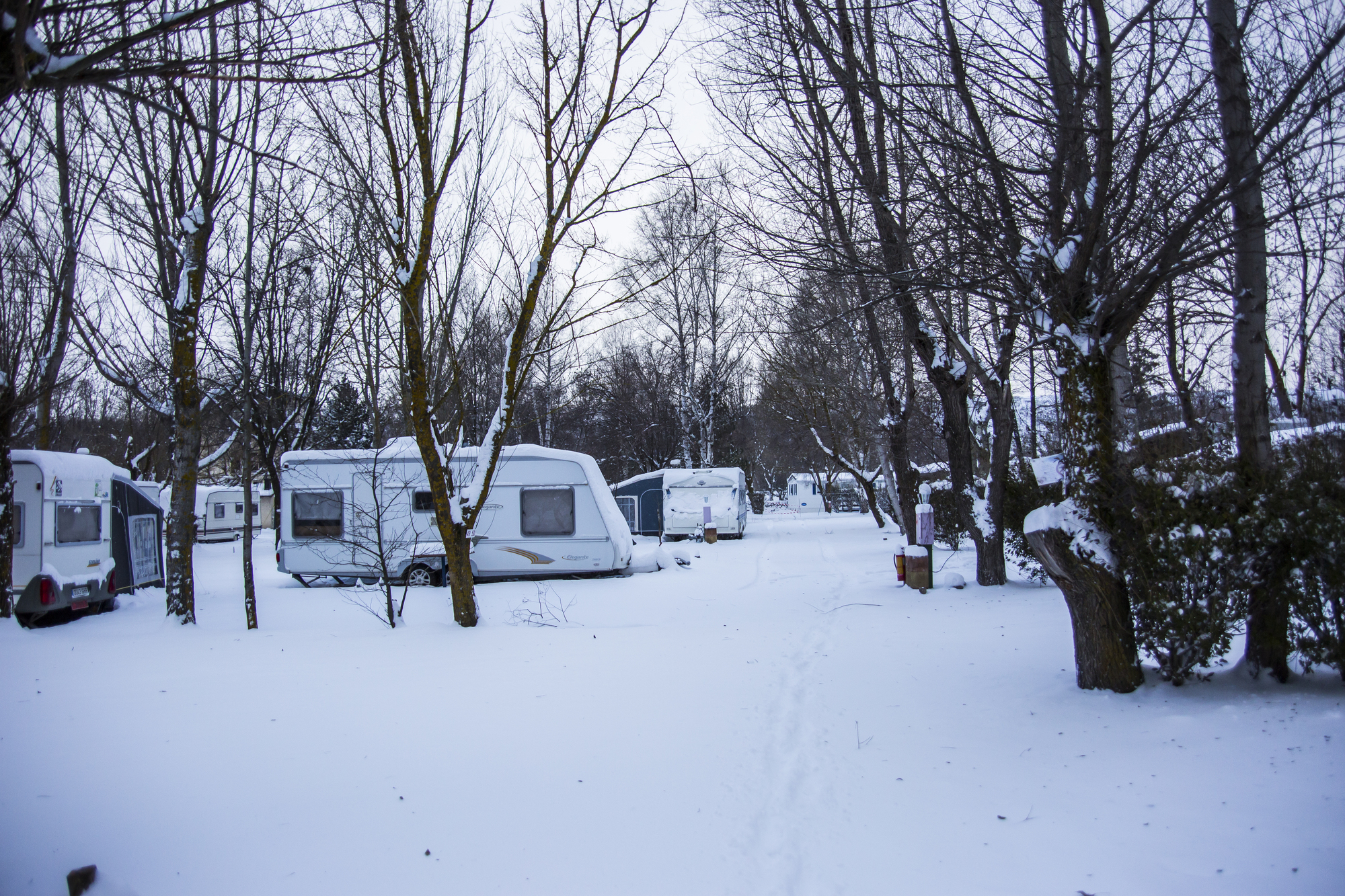Winter RV Storage Options: Finding the Right Fit for Your RV

As winter approaches, it’s time to start thinking about how to store your RV during the cold months ahead. If you’re a new RV owner, you may not have given this much thought, while seasoned RV owners normally have this issue addressed from years and years of experience. For either group of RVers, this is however an important topic – we know your RV is more than just a vehicle—it’s your home on wheels and your ticket to adventure. Protecting your RV, including its glass windows, during seasonal winter storage is key to guaranteeing it’s ready for the road when spring rolls around.
For new RV owners, the choice of where and how to store an RV may seem overwhelming. Should you park it at home, rent a storage space, or leave it at an RV park? Let’s dive into the options and why protecting your RV glass windows is one of the most critical considerations for winter storage.
Option 1: Home RV Storage
If you have space in your driveway, (very large) garage, or backyard, storing your RV at home can be a budget-friendly and convenient option. Some folks even create a tall carport where they park their RV when not in use. However, protecting your RV’s glass from winter weather should be a top priority if you go this route.
• Weather Protection: Snow, ice, and fluctuating temperatures can wreak havoc on RV glass windows and windshields. A crack or chip can worsen during extreme weather, so using a high-quality RV cover is essential. Look for an RV cover that includes reinforced areas around the windows and windshield to prevent damage from debris or falling ice.
• Inspection Before Storage: Before parking your RV for the season, inspect every window frame and seal. Cracked or failing seals can allow moisture to seep in, leading to foggy windows, mold, or mildew. Replacing damaged seals now can save you from costly repairs later.
• HOA Considerations: Be sure to check local regulations or HOA rules to ensure that RV parking is allowed in your neighborhood. Some associations are NOT RV-friendly!
Home storage is convenient and cost-effective, but without proper preparation—especially for your RVs glass windows – it may leave your vehicle vulnerable to winter’s harsh elements.
Option 2: Rental RV Storage Spaces
If storing your RV at home isn’t an option, rental storage facilities can provide a secure solution. These facilities typically offer multiple options based on your budget and protection needs:
• Indoor Storage: The best option for protecting your RV’s glass and overall condition. Indoor storage provides shelter and insulation from snow, ice, and temperature extremes, reducing the risk of cracks or damage to your windows.
• Covered Outdoor Storage: A good middle ground for protection. While your RV is still exposed to outdoor temperatures, a roof structure shields it from falling snow and ice that could damage your windshield or result in a broken window.
• Open Lot Storage: The most affordable option but offers the least protection. If you choose open lot storage, using an RV cover with reinforced glass protection, as discussed in the first section, is advised.
When selecting a rental facility, be sure to look for security features like gated access and surveillance cameras, since vandals and thieves look for storage facilities that are not surveilled. Also ask about protections specifically for windows and glass. For example, some facilities offer additional padding or protective measures for vehicles stored indoors.
Option 3: RV Parks
Some RV parks and campgrounds offer long-term winter storage, often in the same lot space where an RV is parked and used for camping during the warm and active months of the year. This option is ideal for RV owners who might want to use their RV occasionally during the winter, if the RV park allows winter visits.
• On-Site Utilities: Access to electricity at RV parks can help you power dehumidifiers or battery chargers, which indirectly support the health of your RV’s glass by reducing internal condensation.
• Proximity to Resources: Being in an RV community means you can share tips with other owners about protecting your RV during the winter, including best practices for glass window care.
• Cost-Effective: RV parks are often less expensive than dedicated storage facilities, though they may not provide the same level of security or protection.
If you’re considering an RV park, ask about snow removal and other weather-related services that could impact the safety of your RV’s exterior and glass.
Option 4: Climate-Controlled Storage
As an RV owner who wants the highest level of protection, climate-controlled storage offers unmatched benefits. By maintaining stable temperatures and humidity levels, these facilities are ideal for preventing damage to your RV’s glass and other sensitive components.
• Preventing Glass Damage: Temperature fluctuations can cause small chips in your windshield or a damaged window to expand into larger cracks. Climate-controlled storage eliminates this risk by keeping your RV in a stable environment.
• Long-Term Value: While this option is more expensive, it can save money in the long run by reducing the need for repairs caused by winter damage.
This is the gold standard for RV storage, especially for high-end or luxury RVs where every detail matters.
Additional Tips for Protecting Your RV Glass Windows During Storage
At Custom Glass Solutions, we know that protecting your RV’s glass windows and windshield is just as important as winterizing the rest of your vehicle. Here are some lesser-discussed tips to ensure that your glass stays in pristine condition throughout the off-season.
1. Keep the RV Windshield Facing Away from Prevailing Winds
If your RV is stored outdoors, position it so the windshield faces away from prevailing winter winds. This reduces the chance of wind-driven debris causing chips or cracks in the glass.
2. Elevate the RV Slightly
Ensure your RV is slightly elevated to prevent pooling water near windows and seals. Melting snow or ice can seep into seals and refreeze, potentially damaging the glass or the surrounding frames.
3. Install Temporary RV Window Film
Consider applying a temporary, clear window film to the inside of your RV glass. This additional layer of protection helps insulate the glass and reduces the chance of frost forming inside.
4. Shade Windows from Direct Sunlight
Even in winter, direct sunlight through the glass can cause heat and temperature fluctuations that weaken seals and compromise glass integrity. Use light-blocking shades or UV-resistant films to minimize this effect.
5. Document the Condition of Your Glass
Before storing your RV, take photos of the windows and windshield. If any damage occurs during storage, this documentation can help with insurance claims or identifying pre-existing issues.
Trust RV Glass Parts to Provide New RV Glass Windows As Needed!
At Custom Glass Solutions, we know that the condition of your RV windows and windshield are critical for both safety and enjoyment within your recreational vehicle. Before storing your RV for the winter, let us help you verify your glass is in top condition. Whether you need an expert RV window or windshield repair or an RV windshield/window replacement to finish your travel season, our nationwide network of trusted glass shops has you covered for whichever brand of RV you enjoy. You can rest easy knowing that your RV will be ready to hit the road when the snow melts and the open roads beckon. Contact us here to get the process started, please.
Proper winter storage isn’t just about parking your RV—it’s about preserving the memories you’ve made and preparing for the adventures ahead. Ready to store your RV the smart way? Start by protecting its most vulnerable components: your windows and windshield.
Questions or comments on this post? We’d love to hear from you! Use our form here to start a conversation. Thanks for reading.
Written by Matt Eder

